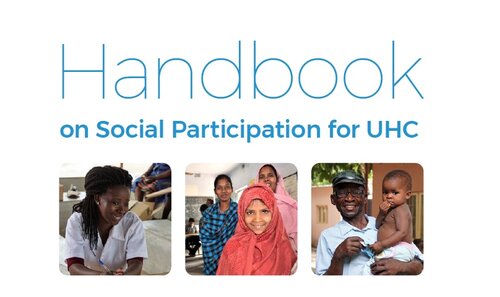Global health leaders and stakeholders gathered in Berlin last...
17 December 2019
Have your say on the contents of the handbook - we want to hear from you!

UHC2030, WHO and the UHC Partnership have launched a consultation for civil society to provide substantial feedback on the contents of the Handbook on Social Participation for UHC.
The ‘Handbook on Social Participation for UHC’ will provide specific best practice guidance to policymakers on how to effectively and meaningfully engage with populations, civil society and communities for policy- and decision-making.
The Handbook is in an advanced stage of development and your views would be useful to shape the final document. You can read an overview of five of the main chapters below, with summaries of what we mean by the topic, why the topic matters to policymakers and key selected messages.
Representation chapter overview
Necessary capacities chapter overview
Deliberation to policymaking chapter overview
Legislative framework chapter overview
Sustaining participation chapter overview
Currently, you can comment on the overview of five of the chapters through a survey. In February you will have the opportunity to comment on the substance of all full chapters. In February and March, there will also be a series of webinars discussing each chapter. Our target audience for the survey are civil society and community groups because they are not usually consulted in the standard WHO peer review processes. However, we also welcome anyone else who would like to contribute, to fill out the survey and give feedback. We would like to remind other contributors that the questions are formulated more for a civil society and community-based group audience but that should not deter any interested party to give input.
Useful links
More information about the handbook
An overview presentation
A link to the survey
Webinar series
We are pleased to announce an upcoming webinar series, led by WHO and in collaboration with the Health Systems Governance Collaborative, Health Systems Global, the UHC Partnership, UHC2030 and the Civil Society Engagement Mechanisms for UHC2030.
The webinars which will present chapter findings of a currently developed WHO guidance document, the handbook on social participation for universal health coverage. In this series, we will conduct four webinars that discuss specific issues while setting up and institutionalizing participatory governance mechanisms. The webinars will start with a presentation followed by Q&A and discussion. Please register and join us.
1. Population engagement and decision making
4 March 2020, 10:00 – 11:00 CET
Register for the webinar
Meeting password: Participation123
2. Representation in participatory processes
18 March 2020, 16:00 – 17:00 CET
Register for the webinar
Meeting password: Participation123
3. Legal frameworks for participation
25 March 2020, 10:00 – 11:00 CET
Register for the webinar
Meeting password: Participation123
4. Capacities for mutually beneficial engagement
1 April 2020, 16:00 – 17:00 CET
Register for the webinar
Meeting password: Participation123
Background to the Handbook's development
Social participation mechanisms are vital for responsive health reforms that leave no one behind in efforts to achieve universal health coverage (UHC). In September 2019, Member States at the UN High Level Meeting on UHC made a commitment to engage relevant stakeholders, including civil society, through establishing participatory and transparent multi-stakeholder processes for influencing policies and reviews of progress on UHC.
WHO’s support to Member States promotes a concept of UHC, which includes the need to foster multi-stakeholder policy dialogue on issues linked to UHC reform. Managing and involving stakeholders, including lay people and the population, requires a specific set of skills, in which governments need to invest.
In response to requests from Member States and the recommendations of the Taskforce on WHO-CSO engagement, WHO and UHC2030 are developing a handbook jointly with civil society actors and Member State representatives through the Social Participation Technical Network.
The handbook draws from both primary (country case studies and targeted country interviews) and secondary data (literature reviews). Data collection is complete and data analyses are ongoing, with support from the Social Participation Technical Network. It is an important time to consult meaningfully with civil society and community-based organisations to ensure that the content will have traction with governments going forward.
